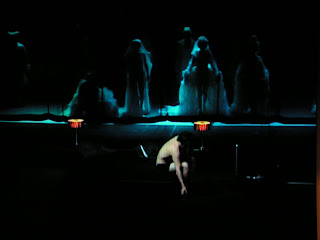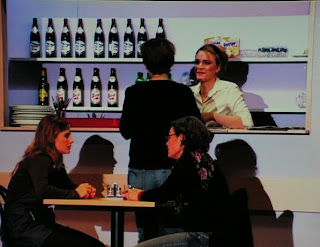
~~~~~~~~~~~~~~~~~~~~~~~~~~~~~
["Soha semmi nem szűnik meg teljesen ezen a világon. Egyetlen valamirevaló elemző se fogja komolyan azt jósolni, hogy hirtelen vége szakad egy második évszázada virágzó tevékenységnek, amelyben ezután is sokaknak lesz öröme…
Ezért ha az információs forradalom egyre táguló láthatárát kémlelve biztosra vehető valami, akkor az az, hogy a komolyzene nyilvános előadása ilyen vagy olyan formában, nagy- vagy kismértékben fennmarad. Ugyanilyen biztos azonban, hogy a zene esténkénti, koncerttermi és operai megszólaltatása belátható időn belül elveszíti azt a központi és fontos helyet, amelyet az elmúlt két és fél évszázadban a városok életében betöltött.
Ezt az állítást több, egymással összefüggő tényező indokolja. A szórakoztató elektronika csábításának engedve világszerte egyre kevesebben látogatják a zenei rendezvényeket. A rendszeres koncertlátogatók félnek a sötét utcán, és nem szívesen teszik ki magukat a forgalmi dugók és a parkolás kellemetlenségeinek. A videoklipe-ken és a gyorséttermek hamburgerein felnőtt új nemzedék fokozatosan érzéketlenné vált a majd egyórás szimfóniák nagyszabású emelkedettsége iránt. A szűkebb család megosztottsága ellehetetlenítette a közös otthoni zenehallgatást. A zeneoktatás - ahogy jelenleg az állami iskolarendszerben folyik - szinte semmit nem ér, amióta nagy pártatlanságában egyenrangúként kezel minden zenét: közönségeset és kifinomultat, kasszasikerre törőt és lélekemelőt egyaránt.
A fogyatkozó közönség és az oktatás érzéketlensége önmagában is súlyos csapás a jegybevételekre - függetlenül attól, hogy a művészetet egyszerre sújtja az állami és cégtámogatások elapadása, a lemezipar hirtelen jött válsága, a sztárok és menedzsereik pénzéhsége. Mindez együtt pénzügyi és szervezeti csődhöz vezetett.
Közismert gondjai ezek a zenei világnak, ám e könyv megszületése előtt egyszer se hozták nyilvánosságra őket. A lemezgyártó cégek vezetői - akik rettegtek a jövőtől - abban reménykedtek, hogy miközben senki nem beszél róluk, maguktól megoldódnak. A három-négy évre előre lekötött közreműködők és időpontok foglyaként olyanok voltak, mint az óceánjáró tisztje, aki látja maga előtt a korallzátonyt, de képtelen kitérni vagy elég gyorsan hátramenetbe kapcsolni, hogy elkerülje az ütközést. Bármily önhittek vagy elővigyázatlanok voltak is azelőtt, most heves rokonszenv ébredt bennünk e jó szándékú szakemberek iránt, akik látva a fenyegető veszélyt és a lomhán köröző cápákat, mindent elkövettek, hogy a komolyzene ne szenvedjen hajótörést.
Nyilvánvalóan a túlélésért folyt a küzdelem, és a gyorsan, határozottan reagáló zenei intézményeknek volt a legtöbb esélyük rá, hogy túléljék az ezredfordulót. Az előrelátás és a merészség általában meghozza gyümölcsét; a cselekvés hiánya mindig kockázatos, főleg életveszélyben. Az olyan művészet, amely a vezetői határozatlanság, az erkölcsi hanyatlás és a pénzügyi talaj vesztés állapotában lépett be a felgyorsult információáramlás korába, mintha a halállal kacérkodna. Dióhéjban, ilyennek találom a komolyzene helyzetét a XX. század alkonyán, és művem nem indulatos képzelgés, hanem jól végiggondolt, intő elemzés."
Norman Lebrecht: Művészek és menedzserek]



Bernhard Lang's and Michael Sturminger's comic psychological opera I Hate Mozart.
When the curtain falls the show is over. So they say. But what if we, the audience, were to boldly change sides and practically step through the looking-glass held up to us obstinately at the theater, to take a seat right in the middle of the forbidden zone vis-a-vis and watch in secret how the performers and masters of the show really behave, behind and beyond the scenes? Watch them discard their costumes and parts, discard the masks of their characters, and change, without further ado, from acting out another's script to acting out their own? Well, then we would see one of those bizarre but true-to-life plays that are only started off by the fall of the stage curtain: / Hate Mozart is the simulation of such a play.
The privileged look behind the scenes of the opera business taken by composer Bernhard Lang and librettist and director Michael Sturminger in their dramma giocoso, reveals a tragicomical tale, involving the petty power games of a conductor hovering at the verge of a nervous breakdown and his opera diva wife, the egotism of agents and managers, identity crises suffered by tenors, and young talents desperately struggling for a career: with casual strokes of the brush I Hate Mozart presents a panorama of profound artistic-social insecurity. And all protagonists of the story are haunted by the bogey of good old Amadé - he whose music demands more than any of them can ever fulfill, where every attempt to do it justice must fail, ever and ever again, for as long as they shall live.
I Hate Mozart is built along self-reflective lines: an opera about an opera production, a burlesque operatic demolition, a backstage report about the making of a fictitious Magic Flute. Sturminger and Lang gleefully put a wrench in the works of the operatic machine, demonstrate the potential frictional losses suffered during auditions and orchestra rehearsals, eavesdrop on the bartering and quiet chats among their protagonists.
The cast of / Hate Mozart features theater managers, cultural affairs officials, musicians, journalists and assistants; it lacks only one character: a director. Sturminger has eliminated himself from the game, acknowledging his biased position. The fact that until the very end no one (on the stage) ever notices the absence of a director, reveals the finer irony of the librettist's approach.
J Hate Mozart celebrates one of those rare liaisons between sophisticated boulevard theater and new music. It is a wild story, which Sturminger has sarcastically dedicated to the Vienna Mozart Year 2006. His opera buffa is obviously rooted in Sturminger's many years of experience as a director at international opera houses. He steers clear of the risk of getting too general by addressing the specifically Austrian state of affairs as in passing, yet by no means mincing his words, making fun of pompous politicians' speeches as well as of the stir commonly caused in this land of alps and culture by the appointment of a new theater manager. Florian Boesch gives a brilliant performance as the conductor worn out between his famous wife and his new lover, a talented young singer from Eastern Europe; the vanity, the tempers and the Italian accent displayed by Boesch run precisely true to type. The hatred of the master composer from Salzburg expressed in the opera's title acquires a fairly differentiated motivation in the libretto: Mozart makes everyone see red because none of those who interpret his music can ever be a match for him. The feeling of not coming up to expectations either as an artist or as a person runs through the opera like a general theme - and produces nightmarish intermezzi. In Sturminger's words: "Those hate best who both love Mozart and despair of him: men and women competing with those who have already cut a path to his music."

No comments:
Post a Comment